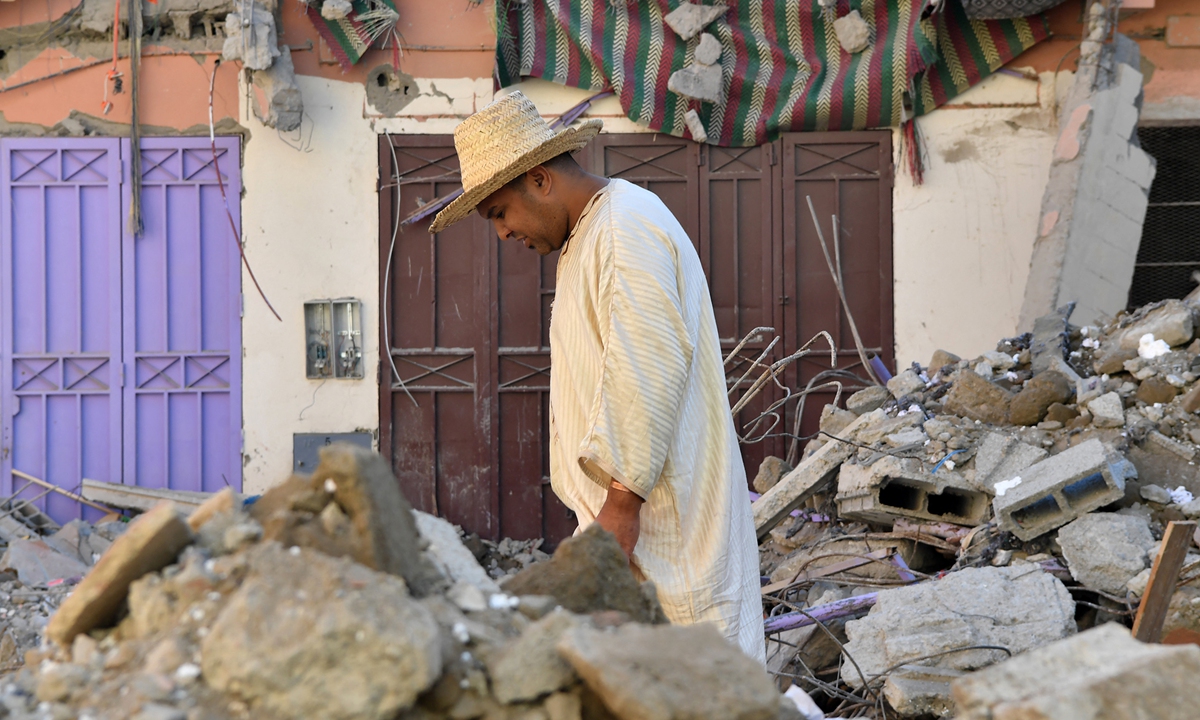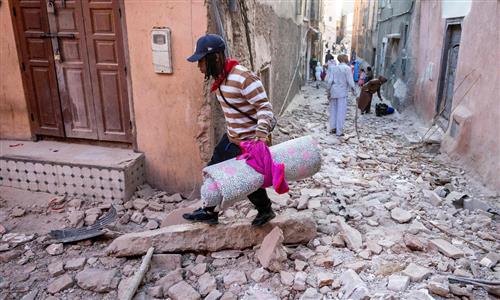Devastating earthquake in Morocco claims more than 2,000 lives
China sends condolences, funds, rescue teams

A resident walks past building rubble in Al Mzouda village in Morocco's Chichaoua province following a devastating earthquake on September 10, 2023. Moroccans on mourned the victims of the 6.8 magnitude earthquake, the strongest-ever to hit the country, that killed more than 2,000 people, as rescue teams raced to find survivors trapped in the rubble of flattened villages. Photo: AFP
Chinese President Xi Jinping on Saturday extended the country's condolences to Moroccan King Mohammed VI over the devastating earthquake that shook the African country late on Friday night, which has caused more than 2,000 deaths as of press time.
The magnitude 6.8 quake hit southern parts of the north African country at 11 pm Friday local time. The epicenter was near the town of Ighil in Al Haouz province, roughly 70 kilometers south of major city Marrakech.
At least 2,012 people have died and more than 2,059 injured in the disaster, according to the local authorities on Sunday morning. Morocco has declared three days of national mourning. The toll is expected to rise as rescuers struggle to reach hard-hit remote areas. Morocco has declared three days of national mourning.
Xi said in his message that he was shocked to learn of the intense earthquake that brought heavy casualties and property loss.
On behalf of the Chinese government and people, Xi expressed deep sorrow for the victims and offered sincere condolences to the families of the deceased and the injured.
Xi also expressed his belief that under the leadership of His Majesty the King, the Moroccan government and people will overcome the disaster and rebuild their homeland at an early date.
The Red Cross Society of China announced right after the disaster that it would provide funds for rescue and relief efforts.
The Moroccan Red Crescent will be receiving $200,000 in cash as emergency humanitarian assistance for its rescue operations and it will keep abreast of the relief needs, the Red Cross Society of China confirmed to the Global Times on Sunday.
The China International Development Cooperation Agency (CIDCA) also expressed condolences and concern over the casualties and property losses on Saturday. "We are willing to provide emergency humanitarian assistance according to the needs of the victims," said Xu Wei, a spokesperson for the Agency.
Chinese medical personnel in the country were among the first to go to the rescue, braving the aftershocks and operating on a number of critically ill patients, according to the Southern Metropolis Daily.
No Chinese nationals have been reported injured as of Saturday, said the Chinese Ambassador to Morocco Li Changlin, CCTV reported.
Condolences, relief funds and rescue forces from other countries and international organization have poured into Morocco.
UN Secretary-General Antonio Guterres expressed sorrow at the loss of life from the earthquake, according to his spokesperson on Saturday. The UN is ready to assist the government of Morocco in helping the impacted population, said a UN statement.
Algeria and Tunisia, Morocco's North African neighbors, quickly reacted to provide assistance. Algeria said it will open its airspace to flights carrying humanitarian aid, a state-owned news agency reported Saturday, while Tunisia announced on Saturday that a rescue team has left for Morocco to aid in search and rescue efforts, the official TAP news agency reported. A statement released by The Tunisian Presidency said that the country will use all its capabilities to support Morocco.
Turkey, which suffered massive earthquakes in February, said it was "ready to provide all kinds of support to heal the wounds," its state-run Anadolu news agency reported Saturday, citing the Turkish Foreign Ministry.
Global leaders including French President Emmanuel Macron, German President Frank-Walter Steinmeier and Russian President Vladimir Putin have also offered their condolences, according to Xinhua.
Residents in Morocco described the quake as a once-in-a-century event, Jun Ma, a longtime Chinese resident in Morocco, told the Global Times on Sunday. Such description was also mentioned in media reports including the BBC.
Line (pseudonym), a Chinese-French tourist in Morocco, said she was on a camping trip in the mountains just tens of kilometers from the epicenter. The tremor was very strong, but none of the tourists was hurt, she said.
"When we drove out of the mountains, it was like we were on the run," she told the Global Times. "There were falling rocks everywhere, and some of the road barriers had collapsed, so I felt like I was going to fall off the mountain at any moment."
Ma, based in Casablanca, was hundreds of kilometers from the epicenter, but he felt the tremor very strongly.
"When the earthquake struck, we all ran out and stayed outside, and it was full of locals spending the night outside and in their cars," he said. "But now I have felt most parts in the country are back to normal, other than the badly hit areas."
Ma, who works in the tourism industry, said that while most tourists were little affected by the quake, it is anticipated that many may cancel future trips to Morocco, in fear for their safety.
Morocco is located in the tectonic zone where the Eurasian plate acts strongly with the African plate. Although there have been no earthquakes of great intensity in this area in recent years, small quakes have been very active, Gao Mengtan, a research fellow at the Institute of Geophysics of the China Earthquake Administration (CEA), told the Global Times on Sunday.
The earthquake on Friday is a strong one that occurred within the African Plate, and the thrust fault system running parallel to the Atlas Mountains is the cause of this earthquake, Gao said.
He pointed to the poor seismic resistance of the buildings in the area for the high casualty toll.
"In 1960, a 5.7-magnitude quake that struck the Moroccan port city of Agadir killed 12,000 people," Gao said. "Judging from the latest images and videos, the damage characteristics of Friday's quake were basically the same as that of decades ago. There was no fundamental improvement in the seismic capacity of buildings."
In 2023, there have been a relatively high number of earthquakes with a magnitude of 7 or above worldwide, mainly in the Eurasian seismic belt, resulting in the most severe casualties in recent years, according to the CEA expert.
Seismic activity along the boundaries of the African Plate is unusually active in 2023, while the fracture zone of the Red Sea Rift and the Great Rift Valley within the plate are also in an active state. The same is true of the Atlas Mountains seismic zone, with the earthquake in Morocco occurring against this backdrop, he said.

